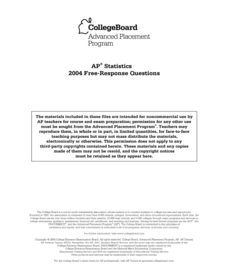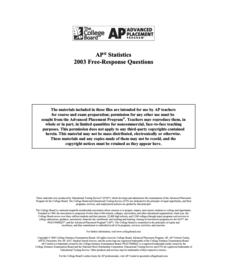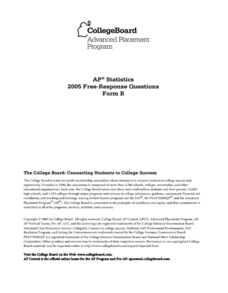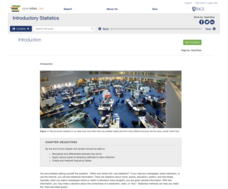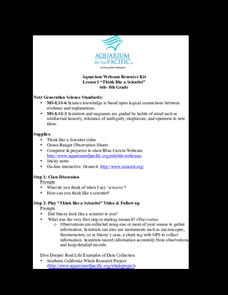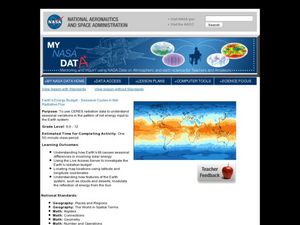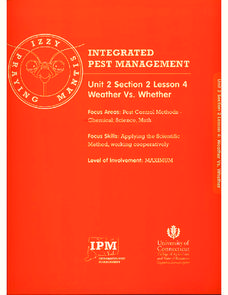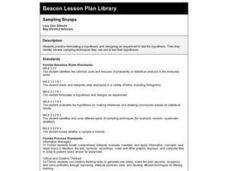Crafty Classroom
Guided Scientific Method
Guide learners through an experiment with a set of worksheets on the scientific method. Six steps prompt your class to ask questions, conduct research, form a hypothesis, test theories, analyze data, and report results.
EngageNY
Drawing a Conclusion from an Experiment (part 1)
Challenge your classes to complete an experiment from beginning to end. Learners make their own hypotheses, collect and analyze their own data, and make their own conclusions. They are on their way to becoming statisticians!
College Board
2013 AP® Statistics Free-Response Questions
AP® exams don't need to be shrouded in mystery. The 2013 AP® Statistics free-response questions are available for instructors to reference. It includes questions on mean, standard deviation, normal distribution, confidence intervals,...
College Board
2010 AP® Statistics Free-Response Questions
Familiarity with the AP® exam is highly beneficial for test-takers. Scholars use the 2010 AP® Statistics free-response questions familiarize themselves with the test content and format. Studies and experiments, linear regression,...
College Board
2004 AP® Statistics Free-Response Questions
Provide some practice showing the work. Pupils work through six free-response questions that require them to show their work. They use their knowledge of statistics to develop solutions to problems within context. Scenarios range from...
College Board
2003 AP® Statistics Free-Response Questions
Hypothetically, knowing the structure of a test should help. Pupils use the released free-response questions from the 2003 AP® Statistics exam to become aware of the structure of questions on the test. Half the questions in the set...
College Board
2005 AP® Statistics Free-Response Questions Form B
Here's another great way to learn from the past. Released free-response questions provide a look into how concepts measured on the 2005 AP® Statistics Exam on Form B. Teachers and pupils review questions that cover concepts such as...
Rice University
Introductory Statistics
Statistically speaking, the content covers several grades. Featuring all of the statistics typically covered in a college-level Statistics course, the expansive content spans from sixth grade on up to high school. Material comes from a...
Aquarium of the Pacific
Think Like a Scientist
Scholars watch a video and meet a scientist who is studying sharks as she explains her observations about the sharks and provides her hypothesis to explain their behavior. Learners then act like a scientist as they watch an aquarium...
Flipped Math
Reasoning and Proof
Make sure the conditions are right. Pupils watch a video introducing conditional statements and their related statements. Learners find out how to identify the hypothesis and conclusion as well as write the converse, inverse, and...
Bonneville
Setting Expectations for Science and Engineering Projects
What is science? Sitting in a whole group discussion, scholars first share their ideas on science and how to conduct investigations. They learn about the steps for scientific inquiry and experimentation. Once finished, individuals then...
Newseum
Civil Rights: Knowns and Unknowns
Class members generate a list of research questions to review the civil rights movement and determine what scholars still need to learn. Groups then select a different compelling question, create a hypothesis and find evidence to support...
Curated OER
Examine the Data
Seventh graders examine a teacher-created database and identify specific variables and develop hypothesis statements as to their possible effect. They create a summary statement either proving or disproving their hypothesis.
Curated OER
United States Entry into World War I: Some Hypotheses About U.S. Entry
Students take a stand on a hypothesis for U.S. entry into World War I, supported by specific evidence.
Curated OER
The Biogeochemical Cycles
The majority of this presentation is a collection of diagrams and graphs that back your lecture on biogeochemical cycles. The last few slides define ecosystems and the Gaia hypothesis. You may find these slides valuable, but will...
Curated OER
Evidence of Evolution by Natural Selection: Testable Hypotheses #2
These slides will activate prior knowledge with real-life examples of natural selection. The predictions and outcomes for those examples are explained. Your students will like the information about the relevant chromosome tests that can...
Curated OER
Mentos Geyser! What's the Fizz Factor?
What is it that makes Mentos candy and cola such an explosive combination? Find out through scientific inquiry and experimentation. This presentation walks learners through the scientific process and allows them to speculate whether it...
Curated OER
Earth's Energy Budget - Seasonal Cycles in Net Radiative Flux
Students attempt to understand seasonal variation by viewing images of the energy received by the earth. In this weather lesson, students view images from NASA of the influx of energy from the sun and make predictions about resulting...
University of Connecticut
Weather Vs. Whether
Monarch butterfly populations have decreased by 90 percent over the past 20 years due to misuse and ineffectiveness of some pesticides. Given the challenge to increase pesticide safety and effectiveness, the class, through discussion,...
Polar Trec
Do Microorganisms Live in Antarctica?
Can microorganisms live in the dry, cold climate of Antarctica? Young scientists view a research project measuring microorganisms in the Taylor Glacier. They record the findings from dirty ice, clean ice, boots, sediment, and more. Then...
Annenberg Foundation
Colonial Designs
The adventures of the New World came at a cost for Native Americans. Scholars investigate the economic side of settling the European colonies. Using video clips, statistical evidence, and primary sources, they create hypotheses and...
NOAA
Understanding El Niño Using Data in the Classroom
Are weather troubles caused by El Nino? An installment of a larger series presents a five-part lesson on El Nino. First, scholars learn to read sea surface temperature maps. Then, they compare them to data on graphs before determining if...
Curated OER
Open-Ended Scientific Method Lab
Students inspect a given problem and come up with a hypothesis. In this investigative lesson students come up with a hypothesis for a problem, test each hypothesis and evaluate how successful each one was.
Curated OER
Sampling Snoops
Students practice formulating a hypothesis and designing an experiment to test the hypothesis. They identify several sampling techniques they can use to test their hypotheses.
Other popular searches
- Scientific Method Hypothesis
- Writing Hypothesis
- Gaia Hypothesis
- Making a Hypothesis
- Writing a Hypothesis
- Hypothesis Writing Labs
- Creating a Hypothesis
- Origin of Life Hypothesis
- Hypothesis Worksheets
- Practice Writing Hypothesis
- Hypothesis Generation
- Gaea Hypothesis






